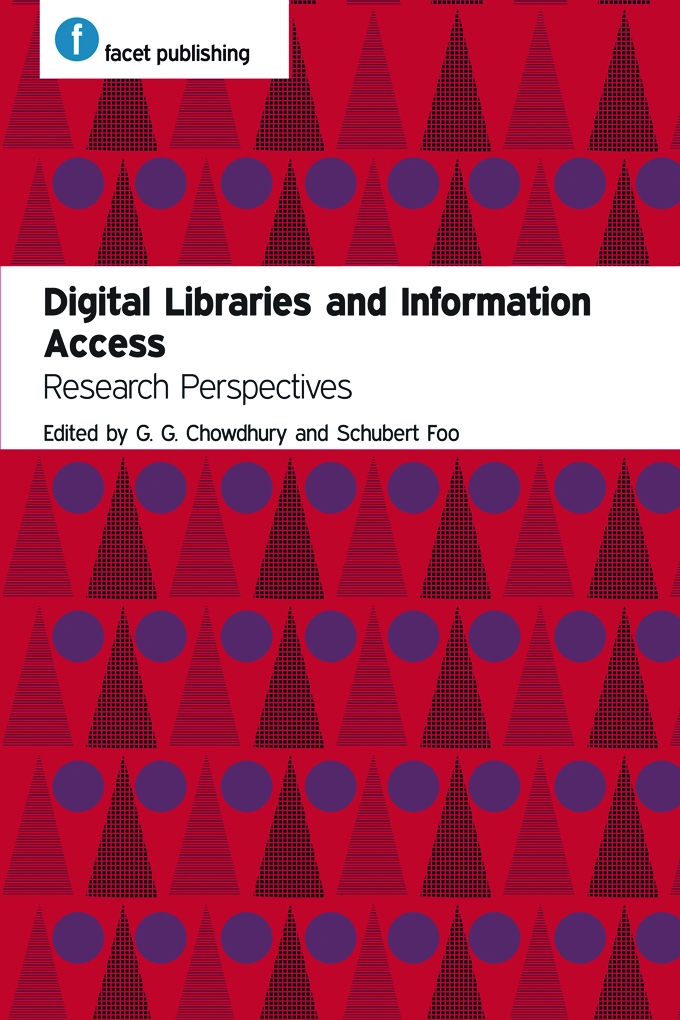Book contents
- Frontmatter
- Contents
- Foreword
- Editors and contributors
- 1 Digital libraries and information access: introduction
- 2 The design and architecture of digital libraries
- 3 Metadata and crowdsourced data for access and interaction in digital library user interfaces
- 4 Information access
- 5 Collaborative search and retrieval in digital libraries
- 6 The social element of digital libraries
- 7 Towards socially inclusive digital libraries
- 8 Users’ interactions with digital libraries
- 9 Digital libraries and scholarly information: technology, market, users and usage
- 10 Digital libraries and open access
- 11 iSTEM: integrating subject categories from multiple repositories
- 12 The usability of digital libraries
- 13 Intellectual property and digital libraries
- 14 Digital preservation: interoperability ad modum
- 15 Digital libraries and information access: research trends
- Index
- Miscellaneous Endmatter
Foreword
Published online by Cambridge University Press: 08 June 2018
- Frontmatter
- Contents
- Foreword
- Editors and contributors
- 1 Digital libraries and information access: introduction
- 2 The design and architecture of digital libraries
- 3 Metadata and crowdsourced data for access and interaction in digital library user interfaces
- 4 Information access
- 5 Collaborative search and retrieval in digital libraries
- 6 The social element of digital libraries
- 7 Towards socially inclusive digital libraries
- 8 Users’ interactions with digital libraries
- 9 Digital libraries and scholarly information: technology, market, users and usage
- 10 Digital libraries and open access
- 11 iSTEM: integrating subject categories from multiple repositories
- 12 The usability of digital libraries
- 13 Intellectual property and digital libraries
- 14 Digital preservation: interoperability ad modum
- 15 Digital libraries and information access: research trends
- Index
- Miscellaneous Endmatter
Summary
This collection of chapters on digital libraries complements other important new books in the Facet Publishing series on digital libraries, information access and data services. Digital libraries have matured over the 15+ years since the term was coined, yet the term ‘digital libraries’ has never come into general use outside a select group of conferences and journals. The research area is expanding, but not always under this term. Some digital libraries research has been subsumed under the rubric of cyberinfrastructure and e-research, other parts under webscience, and yet others under social informatics.
The chapters presented here return to the debate I stoked about the difference between the (digital) library of the future and the future of (digital) libraries (Borgman, 1999). It is indeed time to ask whether a focus on technology has obscured the larger questions of social practice that surround digital libraries, or whether digital library research is at an inflection point, in a pivotal position to respond to the next wave of challenges for an information society.
Chowdhury and Foo return to these early definitions and debates in their opening chapter, providing the necessary historical context to understand current issues. While framed as a book on digital libraries research, chapters range in style from the analytical to the tutorial. Some describe individual research projects and case studies; others synthesize the literature in specific areas. Collectively, the chapters span the scope of current research themes: user interfaces, architecture, equity, technology, organization, curation and social policy.
An edited book on research issues has to balance currency and comprehensiveness, which the editors have done well. Most of the chapters are devoted to foundational matters such as technology and usability, avoiding coverage of breaking topics that may be outdated by the time the volume is in print. That said, they have introduced current issues such as crowdsourced data analytics, open access, intellectual property and scientific data policy. The latter is the focus of my own research, and even here they have framed the emerging concerns of data policy and practice (Borgman, 2012, forthcoming). The book closes with a projection of research trends in digital libraries.
- Type
- Chapter
- Information
- Digital Libraries and Information AccessResearch perspectives, pp. vii - viiiPublisher: FacetPrint publication year: 2012



